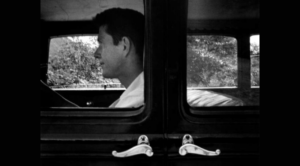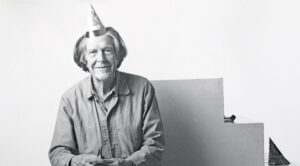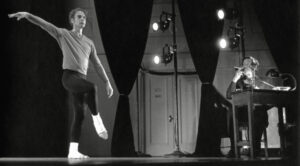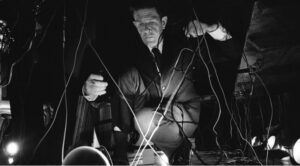
Michigan Opera Theatre’s Artistic Director Yuval Sharon and Icelandic artist Ragnar Kjartansson have never met but have talked online numerous times. This time, Yuval is at the Detroit Opera House, and Ragnar is at home in Iceland, where Yuval meets his children. One is three years old and “ridiculously sweet” and another is eleven, an age where you talk about “death and Will Ferrell and stuff like that.”
Yuval Sharon Seeing your children might be a perfect lead-in to talk about Mozart. My favorite Mozart opera is The Magic Flute, because I like to think of it as a paean to childhood. This notion of Mozart as the eternal child is something that I think about all the time – not the child in terms of infantilization or belittlement, but because Mozart shows the wisdom in childhood. As we get older, we must struggle to maintain the childlike approach to the world that is captured in so much of Mozart's music. I have to suspect that that you share that sentiment in some way, in terms of Mozart's child-like joy in life that Mozart really exudes in so many ways.
Ragnar Kjartansson I always thought about this, in the intense joy of Mozart. I always love to think Mozart as this kind of this person with his intense joy and intense creativity. And you have to imagine he's in pain constantly, because as an 18th-century person, who drank and ate pastries, his teeth must have been rotting all the time. You're in constant pain, which I find so interesting.
YS It’s hard to even fathom that amount of pain, and then to nevertheless find a way to channel something so different. His music is always smiling, even when it is depicting humanity at its most imperfect.
RK It reminds me of a documentary I saw a long time ago about Leonard Cohen, where Bono [U2’s lead singer] says something profound. He's talking about the song ‘Hallelujah’ and that Leonard Cohen looks into the abyss with a twinkle in his eye. That’s so well said, and I think that is the sort of attitude in lots of Mozart. He's totally aware of the pain and suffering in life. And yet there's like this constant twinkle, you know?
YS What role does Marriage of Figaro play for you as an audience member – your experience of the full opera? And then what led you to think about doing this 12-hour version?
RK My affection for Mozart started like so many people of my generation: when the Amadeus movie came out in 1984. I went to see it seven times in the cinema when I was eight. This movie became the bass drum of my imagination. I really remember thinking, “Okay, this is the most beautiful music in the world.” Then I became a grown person, and I just want to see Marriage of Figaro. Before I did this piece, I saw it probably three or four times. But you go through the whole opera, and at the end you come to this moment that drives a stake through your heart. Chris McDonald, who I collaborate a lot with as sound designer in my pieces, came up with this brilliant notion while we were working on Bliss: what's amazing about this moment is the use of nostalgia. The whole opera is so contemporary – 1780s – and then we suddenly come to this part, which sounds like Monteverdi or something. It sounds sort of ancient. And it's this weird thing about nostalgia; it always makes moments so emotional.
YS That's beautiful. In the previous iterations of Bliss, the first time you did it in New York, and then in LA too, the scenography that you created also gives us a sense of nostalgia in the sense that it's kind of a picture-theater, with very two-dimensional sets, classic old opera costumes, things like that.
RK I just love this idea of theater that says, “OK, this is the play…It happens in the 18th century, put them into 18th-century costumes.” There's no twist to it. I always found that kind of a funny idea, you know? Because Bliss gave it a total performance art twist, so it was good to have the setting be this traditional idea of how a Mozart opera should look like.
YS I think that's so wonderful, even though the opera director in me knows it would be impossible to imagine doing Figaro so conventionally, visually.
RK An artist friend of mine [Magnús Sigurðsson] made a picture of himself, naked with a cigar and a finger up his butt, and the picture is called, The Cliché Is the Ultimate Expression. I love that sentence.
YS But as a director, I am very excited about opera as a living and breathing art form. The text and music will always stay the same, but the visual interpretation gets to change generation after generation. Each generation gets to put a new accent on the story each time that we do it. We can't rewrite it, but we can find a way to say these stories are constantly happening again and again, in our everyday lives. The visual is the place where we have a window of openness. But in Bliss, the notion that there is a formal “hack” of the work lets some things be perfectly fine as they are: in preparing La bohème, as we'll do here at MOT in April, we’ll use beautiful 19th-century costumes, but we're going to perform it in reverse order – starting with Act Four, then Act Three, then Act Two and ending with Act One. If we play with the form, the visual world can stay the same; but there must be movement and play in some aspect of the presentation.
RK That’s what artists do: we play.
YS If Mozart was living today, I’m sure he'd be laughing that hysterical laugh from Amadeus, over and over again, all 12 hours. And I think that trying to capture that spirit, his anarchic side, doesn’t make his music any less beautiful.
RK The beauty comes from that sense of wildness. That's also what I really like about repeating this part of the opera, because it's the moment the whole revolutionary idea is distilled. It's like a revolution schnapps. You're reminded that the social system in the opera is totally disgusting. But it's also pretty, because of the forgiveness we see. But that can be dark, as if it’s suggesting, “We will continue with the status quo. Everything's forgiven. We will be happy.” When we're doing it, we are thinking about the 18th century’s brutal aristocracy. But also in patriarchal terms: this dude does something wrong, and the lady forgives him because she's kinder than him. It's this sort of Sisyphus task, which women have to go through again and again in the patriarchy. So there’s this total joy of forgiveness in the work on the one hand, but also this really depressing part on the other.
YS Is it just depressing to feel like the boulder is going to roll down the hill, that the Count is just going to have to ask forgiveness again, without ever learning from this mistake? Or is there hope that any one repetition might be the last?
RK There is hope. But it does not happen in with one forgiveness. It takes two, three hundred years.
YS And we're still working at it. When I think about this final scene, I think about in relation to Greek theater: The Countess takes the role that would normally be occupied by a goddess. The humans in classic theater find themselves in such an immovable predicament, and the only one who can change it is a god or goddess – Athena, in her wisdom, who descends from the heavens to intervene. I think what you're saying about the “revolutionary schnapps” at the heart of this moment is that it’s not a goddess but a human who offers forgiveness. So humans could be their own divine force. You see this idea so often in Mozart, the proximity to divinity that humanity actually possesses – if we can pay attention to it, and if we can cultivate that aspect of ourselves. The Countess can achieve what we would otherwise have to look to the gods to give us.
RK This is humanism at its core, and that's actually what was starting to happen when this opera is being written. This is about the time of famine in France, which caused unrest and then the revolution; the United States is starting to happen. Here in Iceland at the same time this opera is performed, we have the worst volcanic eruption in our history, which caused 8 million people around the world to die. So it's interesting to think about this period, when modernity is starting.
YS When I think about this particular piece of yours, I can't think of a better kind of living metaphor for what opera is all about, which is, there is an utter absurdity to it. And yet, you can't think of anything more aspirational and beautiful.





